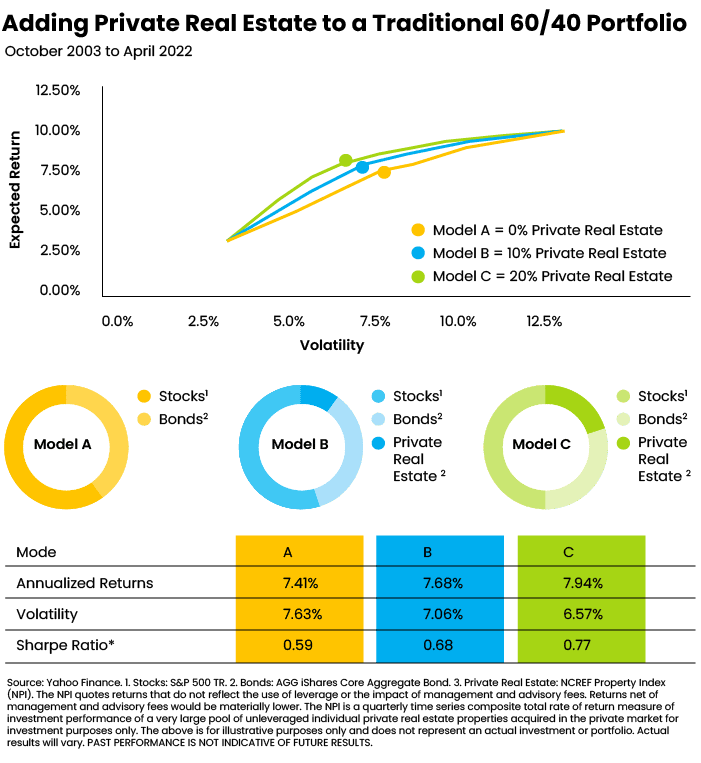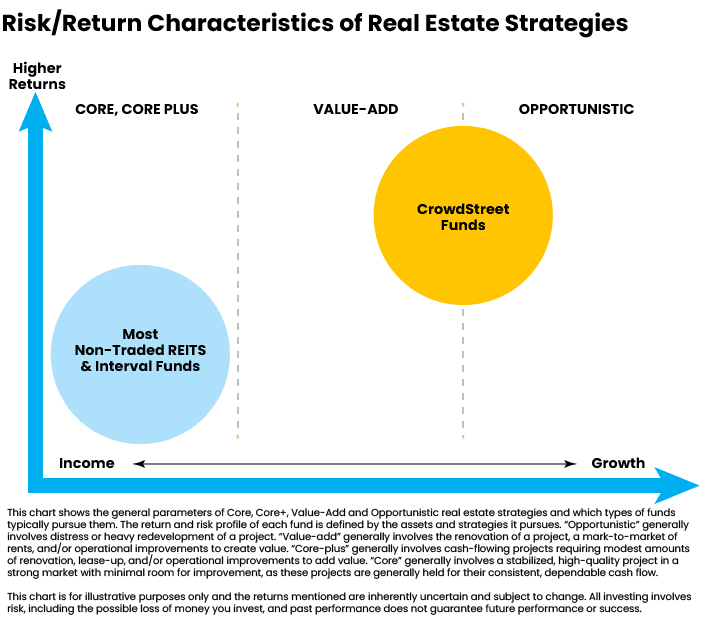The debate over the viability of the classic 60/40 model investment portfolio always picks up steam during turbulent economic environments. But both research and historical returns have clearly shown that increasing asset diversification in a given portfolio—for example, by including private market investments or so-called alternative investments—tends to improve its risk/return characteristics over time.[1] In addition, some private real estate assets have exhibited a tendency to help mitigate the impact of inflation because property owners have the ability to adjust rent prices upwards.
Potential to Improve the Odds of Success
The chart below, sourced from Yahoo Finance, shows the performance of three illustrative portfolios with different exposures to private real estate between October 2003 and April 2022. According to the model, including an allocation to private real estate can reduce the portfolio’s overall volatility while potentially improving overall returns.
 The three examples provided are intended to illustrate the effects of adding varying amounts of private real estate to an investor’s portfolio. These models are for illustrative purposes only and do not represent actual investors or investments. According to the sample charts, Model A is the classic 60/40 portfolio with zero exposure to private real estate. Model B shows a 10% private real estate position, with 55% in stocks and 35% in bonds. Model C puts 20% in private real estate, 50% in stocks, and 30% in bonds.
The three examples provided are intended to illustrate the effects of adding varying amounts of private real estate to an investor’s portfolio. These models are for illustrative purposes only and do not represent actual investors or investments. According to the sample charts, Model A is the classic 60/40 portfolio with zero exposure to private real estate. Model B shows a 10% private real estate position, with 55% in stocks and 35% in bonds. Model C puts 20% in private real estate, 50% in stocks, and 30% in bonds.
Fine-tuning Risk/Return
Diversifying existing real estate holdings by including growth-focused strategies with the potential to offer enhanced returns can help advisors fine-tune their clients’ portfolios to fit individual risk tolerances and investment objectives.
 Private commercial real estate has become an increasingly important allocation for some sophisticated institutional investors, helping them complement their Core, Core-Plus real estate holdings with growth-oriented Value-Add and Opportunistic strategies, according to the Hodes Weill & Associates 2021 Institutional Real Estate Allocations Monitor report. And, while individual investors have historically accessed commercial real estate primarily through publicly traded REITs and other income-focused funds that invest exclusively in Core and Core-Plus properties, they are also beginning to look for access to private funds, turning to their financial advisors for help or deciding to go it alone.
Private commercial real estate has become an increasingly important allocation for some sophisticated institutional investors, helping them complement their Core, Core-Plus real estate holdings with growth-oriented Value-Add and Opportunistic strategies, according to the Hodes Weill & Associates 2021 Institutional Real Estate Allocations Monitor report. And, while individual investors have historically accessed commercial real estate primarily through publicly traded REITs and other income-focused funds that invest exclusively in Core and Core-Plus properties, they are also beginning to look for access to private funds, turning to their financial advisors for help or deciding to go it alone.
Where to Start?
There are two primary challenges investors and their advisors face when looking to invest in private commercial real estate through a professionally-managed fund structure.
Historically, private commercial real estate funds have been created for ultra high net worth investors, endowments, and other institutional investors. These funds are typically not structured with smaller investors in mind and often have high investment minimums $5M – $10M+.
Additionally, finding quality fund managers typically requires having a broad network and investment expertise in the asset class, as well as dedicated resources and a rigorous process for conducting due diligence.
However, today there are funds, like those managed by CrowdStreet Advisors, that are structured with smaller investors in mind while not compromising on investment expertise and due diligence procedures.
For advisors looking to improve risk/return profiles, private commercial real estate may be a viable consideration. And now it has finally become more accessible.
To learn more, please reach out to us at wealth@crowdstreet.com or visit us at crowdstreetadvisors.com.
[1] Baird Private Wealth Management, http://www.bairdfinancialadvisor.com/schmidtvanderleestwenzelgroup/mediahandler/media/163794/The_role_of_alternative_invst.pdf
This article was written by an employee(s) of CrowdStreet and the contents of this publication are for informational purposes only. Neither this publication nor the financial professionals who authored it are rendering financial, legal, tax or other professional advice or opinions on specific facts or matters, nor does the distribution of this publication to any person constitute an offer, recommendation, or solicitation to buy or sell any security or investment product issued by CrowdStreet or otherwise. The views and statements expressed are based upon the opinions of CrowdStreet. All information is from sources believed to be reliable. This article is not intended to be relied upon as advice to investors or potential investors and does not take into account the investment objectives, financial situation or needs of any investor. All investing involves risk, including the possible loss of money you invest, and past performance does not guarantee future performance or success. All investors should consider such factors in consultation with a professional advisor of their choosing when deciding if an investment is appropriate. CrowdStreet assumes no liability in connection with the use of this publication.
CrowdStreet, Inc. (“CrowdStreet”) offers investment opportunities and financial services on its website. Advisory services are offered through CrowdStreet Advisors, LLC (“CrowdStreet Advisors”), a wholly-owned subsidiary of CrowdStreet and a federally registered investment adviser. CrowdStreet Advisors provides investment advisory services exclusively to privately managed accounts and private funds and does not otherwise provide investment advisory services to the CrowdStreet Marketplace or its users. CrowdStreet and its affiliates do not endorse any of the opportunities that appear on this website. Investment opportunities available through CrowdStreet are speculative and involve substantial risk. You should not invest unless you can sustain the risk of loss of capital, including the risk of total loss of capital. All investors should consider their individual factors in consultation with a professional advisor of their choosing when deciding if an investment is appropriate. Private placements are illiquid investments, in that they cannot be easily sold or exchanged for cash, and are intended for investors who do not need a liquid investment.
This article should not be construed as an investment recommendation or advice, or as an offer to sell, or the solicitation of an offer to buy an investment. Offers to sell, or the solicitation of offers to buy, can only be made through official offering documents, such as a subscription agreement and a private placement memorandum, that are generally produced by the Sponsor of the investment opportunity (the “Offering Materials”). Before making an investment decision with respect to any investment on the CrowdStreet Marketplace, potential investors are advised to carefully review the Offering Materials. Investors should consult with a financial advisor, attorney, accountant, and any other professional that can help in understanding and assessing the risks associated with any investment opportunity.







